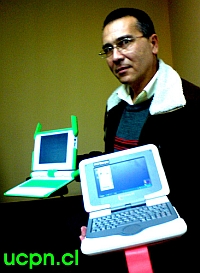The Brazilian auction to purchase 150,000 computers for children is on currently on hold after the end of the first round which ended on December 19th. Positivo Informática won the first round of biding with the lowest offer, 98 millions of Reais, 6 million less than OLPC had offered.
No one has had access to details of each proposal but the most probable culprit were customs duties in Brazil which, along with all the maintenance and warranties, brought the total of each XO to $387,39, twenty dollars over the winning model. Positivo had by it's side decades olds tax policies that favors local assembly with lower taxes on electronics components, not ready made equipment.
The model offered by Positivo is still unknown but Intel has already congratulated them for winning, which led all to believe that it's a newer version of the Classmate PC with built-in camera and mesh networking.
To bring yet more confusion to the issue, in the same morning that the auction began was issued an official statement freeing all candidates of the taxes, but no one, neither the candidates or the auction judges, were informed about it.
Currently the fate of the 150,000 laptops are unknown. The judges consider the price high but the rules allow exclusive negotiations with Positivo Informática - the lowest bidder.
Jaime Balbino, a fervent OLPC supporter made an interview with David Cavallo, the main representative of the OLPC in Brazil. They talked about the influence of Brazil in the development of the model advocated by OLPC, the Brazilian development policy, competition against monopolies of technology, the bidding (won by Positive Computing) and the future of the entity without the expansion of the Brazilian experience.
From Jaime's interview:
David Cavallo: I personally believe that things went somewhat astray for a variety of reasons and that the structure of the governmental purchase request led to a result no one seems to be satisfied with.David Cavallo then reminds us that the project can go on, with or without Brazil as they have already enough buyers to make it sustainable.We are a non-profit. Our price to any country, including Brazil, is the cost of the laptop itself. Uruguay purchased the laptop for USD$197. They also purchased in a way that brought connectivity to homes and communities. We will not bid above our costs. We cannot bid below our costs, as a for-profit might do in order to make profit by charging more for other products and services, or to lock out competition and raise prices subsequently.
So the huge price differential was because of the extraneous conditions imposed upon price for the bid. This includes local assembly (NOT PRODUCTION OR FABRICATION, for which conditions do not exist at this time in Brazil), various taxes, shipping (of components which also raises costs), and a 3-year warranty. They also decided to select solely on the basis of price, without consideration of the display, or power consumption, or eco-friendliness, or connectivity in and out of schools."
For OLPC in Brazil, the game doesn't ends until the judge brings the hammer down, and the last message from the auction site was that the bid was closed for an indeterminate time.
If we do not hear from them today, we will probably not hear anything until after the Christmas holidays are over. Or worst, we might have to wait until the new year begins because, as a local saying goes
"in Brazil the year doesn't start before the carnival ends."And by then, it might be just too late.




Is there a way to call a mis-trial/mis-auction? It seems to me that OLPC may be able to win out if there had been proper communication about the taxes. I wonder if OLPC has been delinquent communicating with the public as of late because of a bug they caught from the brazilian Government being delinquent to pass along information as well...?
Have any of you read "Atlas Shrugged" by Ayn Rand. Well in this book is a story about an Industrialist entrepreneur and the blood suckers who live off of his wealth. Well Ayn Rand believed that the most moral endeavor was the pursuit of profits and greed was a good thing.
What if olpc changed its approach and became a for profit. It could reward its developers with money and therefore attract more talent. It could use cut throat tactics like Intel does to caapture market share in developing nations.
I know it wont happen, but it will be interesting to see if ten years from now a for profit company ends up creating a cheaper better laptop before olpc does.
Regardless of the outcome of this competition olpc does get the credit for being the catalyst of this push for cheaper more reliable and educational laptops. I don't know the morals of for profit or nonprofit but Ayn Rand is predicting that a for profit like Everex might come out on top.
p.s. If there was ever a better argument for free trade, this situation, where brazil's tariffs nearly doubled the cost of the xo in that country, this is the case for an american hemisphere free trade agreement.
Looking forward to widespread failure of the Classmate. (along with widespread success of the OLPC of course). I expect the Classmate to fail because it is simply not made for the third world or for education. It isn't rugged and it isn't pre-installed with education software. The schools will likely respond to the first problem by requiring students to leave the laptop at school (the lack of anti-theft features will back up this action). The second problem will compound this response and lead to a complete lack of benefit from the device. The laptops will become about teaching "computer skills" - not constructive learning. Meanwhile, the countries that go with OLPC will be giving their children a better education than most western societies. School attendance numbers will go through the roof.
So yeah, let them have their Classmates. Watch as Intel silently kills the product line after 3 years.
Obviously Intel is selling a a loss, why would Intel care about 3 million dollars when what is at stake for Intel is to block the OLPC project which basically means a total revolution of the PC business not only in developping countries but especially also in developping countries.
Taxing the OLPC is simply completely ridiculous. It's like taxing the rice that the Red Cross brings to a starving country. And wanting to manufacture laptops locally IS A JOKE. Most of the chips are never going to be produced outside of Taiwan and China, especially NOT when produced in such low quantities. WHO ARE THEY KIDDING? Assembling laptops is NOT a kind of job that would improve whatever IT industry Brazil wants to have. Assembling laptops is basically slave labour, and NOBODY should want to have that kind of job in their own country. What Brazil should aim for is innovation in software, in design, web 2.0, IT services, basically copy whatever the Silicon Valley is doing to make money. You are not going to have any manufacture within the USA of 95% of the components of any computer.
Funny how some of the points that were innitially in the auction requirements seems to have been removed:
# A video camera, microphone and audio output
# Support temperatures between 5 and 41 degrees Celsius
# A screen at least 7 inches, a minimum 800x600 pixel, not too much reflective on highly bright areas and have a high contrast in dark places
# And the ability to mesh network with one another
None of which are achieved by the current version of the Classmate PC. So I guess Intel is showing to the Brazillian politicians a secret next generation Classmate PC which has not yet been unveiled to the general public? Or did someone somehow decide to remove those requirements? Or were they not really requirements?
I really do wonder if Dr. Negroponte foresaw the cutthroat monopolizing juggernaut would enter the market as a competition. As much as it was a wondrous effort on OLPC's part to develop such product/program in couple of years, I bet Intel put together a team just so they can have Classmate made for any possibility of OLPC's success... And it looks like it's paying off.
For Brazil, you would think that they would predict that it is better to get in bed with non-profit organization in a long run... But we are talking about technology... How do you compete against names like Intel and MS?
:(
I don't think this is about technology, cause if it was about technology, OLPC would win these kinds of bogus auctions. I think this is about one established PC giant Intel, wanting to make the cheap educational laptops revolution a failure. Cause cheap laptops means NO MARGINS, means NO PROFITS, means NO MORE CONTROL over the market.
Trent. It's tempting to feel that way but don't. My worst fears is that the lack of collaborative features on the classmate laptop will seriously restrain it's use. The result could be th ekids using computers for the same reason most adults: watch videos, play games and read blogs alone. That could stain the whole reputation of the idea that laptops can help education.
Charbax: No requirements were taken off. They wrote the paper to make the XO fit all requirements but legally anyone was allowed to participate. No one has seen the Positivo laptop but most people are already calling it the "classmate 2" wich would have camera, mesh networking and etc..
Beyond that I totally agree on which subsiding computer assembly will not foster any long term industry and the money would be better spent at buying more laptops..
If the requirements have not been taken off, that would mean that Intel's Classmate 2 would be fanless, have a newer better screen, include a camera and integrate somekind of mesh networking.
Now that would be a good move from Intel, if they are using the right technologies. But since they are competing against the OLPC, probably that it's not the same kind of wireless, screen, power consumption features that would be on this so-called Classmate 2 which Otellini will show at the CES.
If Intel is making a copy of the XO then that's great, but they probably aren't with the "Classmate-2", so this next gen classmate most probably will be useless to the OLPC project until Intel finally decides to simply put their processor in an Intel-version of the XO-1 and perhaps help with further technological achievements such as lower power consumption, lower price and WiMax on the XO-2 for in about a year.